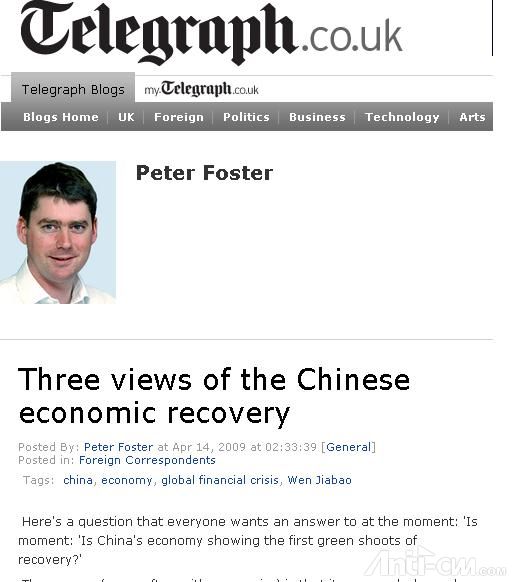本帖最后由 aha 于 2009-4-15 16:58 编辑
【原文标题】Three views of the Chinese economic recovery
【译文标题】三种角度看中国经济复苏
【来源地址】http://blogs.telegraph.co.uk/peter_foster/blog/2009/04/14/three_views_of_the_chinese_economic_recovery
【译者】ahaA-
【翻译方式】人工
【声明】本翻译供Anti-CNN使用,未经AC或译者许可,不得转载。
三种角度看中国经济复苏
此时此刻,所有人都想知道答案的一个问题就是:中国经济是否已度过寒冬,生出嫩芽?
这个答案(经济学家常这么做)很大程度上取决于你是在和谁讨论,以及,你敢把目光投向多远的将来。
在某个层面上答案显而易见,但你必须警惕数字科学,经济只是其体现的一部分,动机、兴趣和意识形态等对这些数字的影响都很大。
中国总理温家宝似乎认为情况在向好发展。在早先流产的东盟峰会上,温估计(我解读):“问题依然严峻,不过我们看到积极的变化”。
他说,中国的四万亿经济刺激方案已经实施,银行贷款增加,房地产复苏,最近的贸易数据显示中国的出口下滑幅度正在缩减,相比二月份的25.7%,三月份为17%。
温先生说所有这些坚实的信息都显示中国经济正在“逐渐复苏的过程中”。
也许对温先生的话我应该照章全收——他毕竟是中国的总理——但真这么做,我可能就是傻瓜了。
为什么?好吧,半年来,我能想起至少三次温先生演讲中谈到“信心”——这个重要的所有商品社会中的无价之宝。
我知道他为什么这么说,但他如此的谈话不幸的反映出他对于商品政治社会的另外两个无价之宝——“信用”和“信任”的忽视。
我们怎么知道温先生果真认为经济开始复苏,还是仅仅努力为这个体系增加“信心”呢?我们无从得知。
接下来怎么做?让我们寻找一些政治上“独立”的分析吧,这里大概可以分为两类:商业派和学院派,虽然他们有时会相互重叠。
在商业这边,每天各种投资银行、基金管理者和贸易组织者都在发表他们所在区域的经济活动报告,我的收件箱每天都充斥着各种分析和研究结果。
我再解读一下,主要的基调都认为经济情况在向好发展。投资在恢复原因是中国指示他的银行增加贷款,房地产销售再次见长,受到刺激计划的激励,建筑工业顺势上紧发条。
在非机构方面,我也看到了信心。上周我参加的一次私人谈话中,一位世界知名奢侈品牌的中国高级总裁告诉我说,所有国际媒体都错了,中国一直在成长,未来,他说道,是一片光明。
不过这样的商业预言明显考虑到了他们的自身利益。毕竟,就在几年前,同一批组织,还在优良数据的支持下,坚定的认为,中国的商品,股票以及资产都将以摧枯拉朽的势头高歌猛进下去。
那就让我们来看看第三种角度:象牙塔里的教授和政策研究者们,就算他们有自己意识形态上或知识上的观念,他们至少没有明显的政治或商业考量。
我尽可能多的和这些人交流,慢慢的就对中国的长期经济发展有了一个更加清晰的视野。
虽然大部分也都认同温先生的刺激方案有助于中国经济增长在今年保持稳定——世界银行的预测是6.5%,悲观点的独立分析给出5%,而温先生仍旧非常有“信心”的坚持8%。——但这个刺激方案并不能解决一些根本的结构性问题。
不同的经济学家对此有不同的视角,但其中一些共同的观点认为,相比中国的投资性增长刺激方案来说,有机的,草根的经济活动增长显得不足。
关于计划更好的医疗保健系统,鼓励中小企业发展和增加研发投入等方面,虽然讨论都在进行,但只要落实到数字上(在此问题上我相信那些比我聪明的人),就少得可怜,远不足以给中国的国内经济带来有意义的结构性变革。
总而言之,温先生4万亿的方案会让这场“中国秀”继续上演几年(虽然没有效率),但是如果全球需求得不到恢复(世界银行认为恢复不太可能),或者中国的国内消费和生产力得不到根本的成长,即使温先生投下财政化肥,中国发出的嫩芽也无法向下生出坚实的根茎来支撑未来长远的发展。
Three views of the Chinese economic recovery
Here's a question that everyone wants an answer to at the moment: 'Is China's economy showing the first green shoots of recovery?'
The answer (as so often with economics) is that it very much depends who you talk to, and how far ahead you dare to look.
On one level this is a statement of the obvious, but it's always worth remembering that economics is only in part a numerical science. Motive, interest and ideology all play a huge part in how you read the numbers.
Wen Jiabao, China's premier seems to think things are getting better. Speaking on the sidelines of the aborted ASEAN summit, Wen reckons (and I paraphrase) that 'things are still tough, but he can see 'positive changes' going forward.
China's £400bn stimulus package is kicking in, he says, bank lending is improving, real estate sales are coming back and latest trade figures show that China's exports declined year-on-year at a slower rate in March (17pc) than in February (25.7pc).
Mr Wen says these are all concrete reasons to believe that China's economy is "in the process of gradual recovery".
Perhaps I should take Mr Wen at face value - he is, after all China's premier - but something tells me I'd be a fool if I did.
Why? Well, I can recall at least three speeches in the last six months in which Mr Wen has spoken about the invaluable need for that most priceless of all economic commodities 'confidence'.
I can see why Wen said that, but unfortunately such statements only serve to devalue two other equally priceless political commodities - 'credibility' and 'trust'.
How do we know if Mr Wen really thinks the recovery is beginning, or if he's just trying to breathe some 'confidence' back into the system? Short answer is, we don't.
So what to do? Seek some politically 'independent' analysis, of which there is broadly two types: commerical and academic, although the can two sometimes overlap.
On the commercial side, my inbox is daily clogged with research notes and analysis from investment banks, fund management houses and trade organisations all reporting on their spheres of economic activity.
I paraphrase again, but the general theme is that things seem to be on the up. Investment is returning as China orders its banks to lend, real estate sales are starting up again and everyone connected to the construction industry is slathering at the projects now being expedited by Mr Wen's stimulus package.
On a non-institutional level, I also see confidence. Last week I attended a private talk by a senior Chinese executive from a global luxury goods brand who said the international media had it all wrong. China (and his business) was still growing. The future, he said, was fundamentally bright.
But such commercial Oracles obviously have interests of their own. After all, these were the same organisations who only a few years ago were pushing me equally conclusive and numerically supported reports that commodity, equity and asset prices were going to rise inexorably.
In the short term, I can see that some banks and businesses are going to do well out of China's stimulus plan, but that is a very different thing from China's economy being on the path to sustainable recovery.
Which brings us to a third category of analysts: the professors and policy wonks who don't have such obvious political or commercial axes to grind - even if they do have some ideological/intellectual ones.
Speak to these people - and I do as often as I can - and you start to get a more sobering picture of where China's economy is heading in the longer term.
While most seem to agree that Mr Wen's stimulus package is going to stabilize China's economic growth this year - the World Bank says 6.5pc, gloomier independent analysts say 5pc while Mr Wen is still shooting for a very 'confident' 8pc - it isn't addressing some big underlying structural problems.
Different economists come at this from differing perspectives, but many share the concern that China's investment-led growth plan isn't being matched by a growth in organic, grass-roots economic activity.
There's talk of better healthcare plans, boosting Small and Medium-sized Enterprises (SMEs) and investing in R&D, but when you crunch the numbers (and here I rely on the calculations of brainier men than me) it's not looking like nearly enough to bring meaningful structural reform to China's domestic economy.
In summary, Mr Wen's £400bn stimulus will keep the 'China show' on the road for a couple of years (albeit inefficiently) but without either a pick-up in global demand (unlikely says the World Bank) or a serious increase in domestic consumption and productivity, China's green shoots will not put down the substantial roots needed for sustainable long-term growth - Mr Wen's fiscal fertiliser notwithstanding.

|